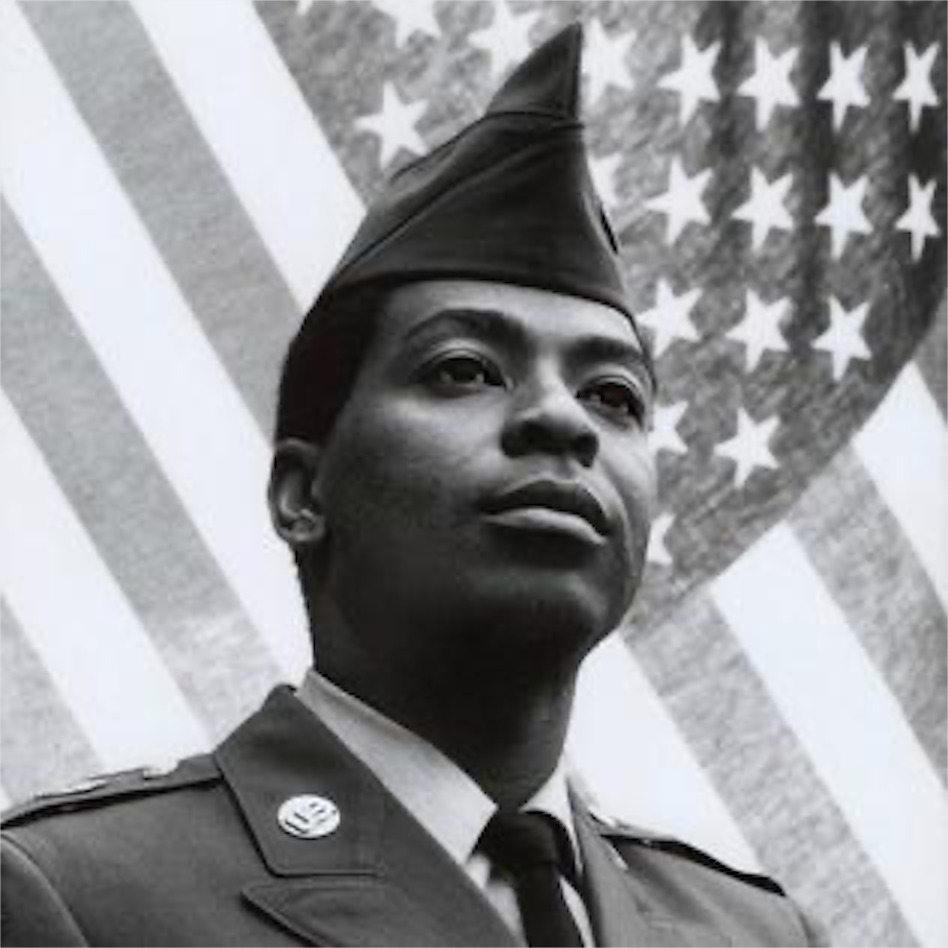We honor LGBTQ pioneers on Memorial Day weekend
This year, Memorial Day falls on Monday, May 31, the day before Pride month begins. The closeness of these two holidays makes me think about Pride, and our military.
So along with the fun and frolic of this long weekend comes a time of reflection and remembrance. And it occurred to me that I didn’t know very much about the military side of my LGBTQ+ “family” who laid down their lives to make the world a freer and safer place. But with a little research, I do now. These folx are a part of our history and worth knowing about. Let me share some with you. Join me in remembering some of the queer military personnel who, along with fighting for America, fought for our LGBTQ+ rights as well. Let us salute them in our celebration of remembrance and pride.
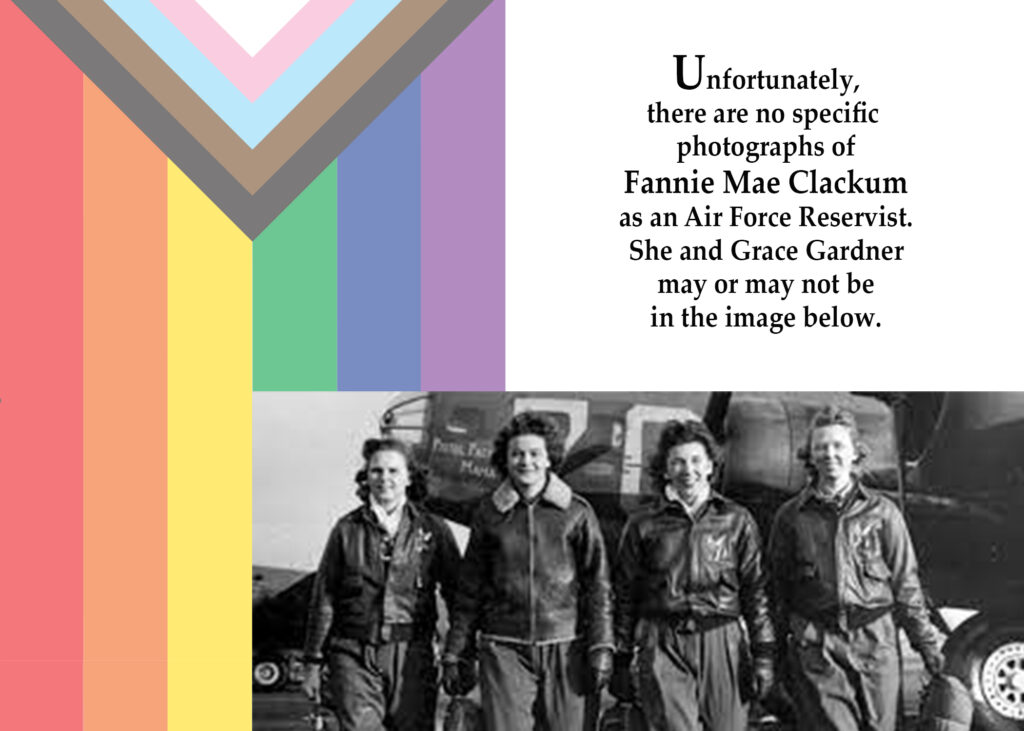
Fannie Mae Clackum (she/her/hers) and Grace Garner worked together as Air Force reservists. In 1951, the Office of Special Investigations looked into the Air Force’s suspicions that Clackum and Garner were lesbians by setting up a sting operation in order to prove these allegations. Later that year, Clackum was told that some action was being contemplated against her and was offered the chance to resign. She refused and requested a trial by court-martial to force the Air Force to provide information on the accusations against her and allow her to present evidence on her own behalf. A court martial was denied and in January 1952, both Clackum and Garner were demoted and discharged under less than honorable conditions.
The two women, who reportedly lived together in Georgia, spent 8 years fighting their discharges. Finally in 1960, Clackum and Garner prevailed in the US Court of Claims and their respective discharges were invalidated. They received all back pay for the remainder of their enlistments. While their cases were overturned because the Air Force kept Clackum and Garner unaware of the allegations and proceedings prior to their discharges thereby denying them due process, their cases were among the earliest known instances of successful appeals of discharges from the U.S. Armed Forces on grounds of homosexuality. (Can you believe all this happened back in the ‘50s?) Air Force Reservist Fannie Mae Cackum passed away in 2014.
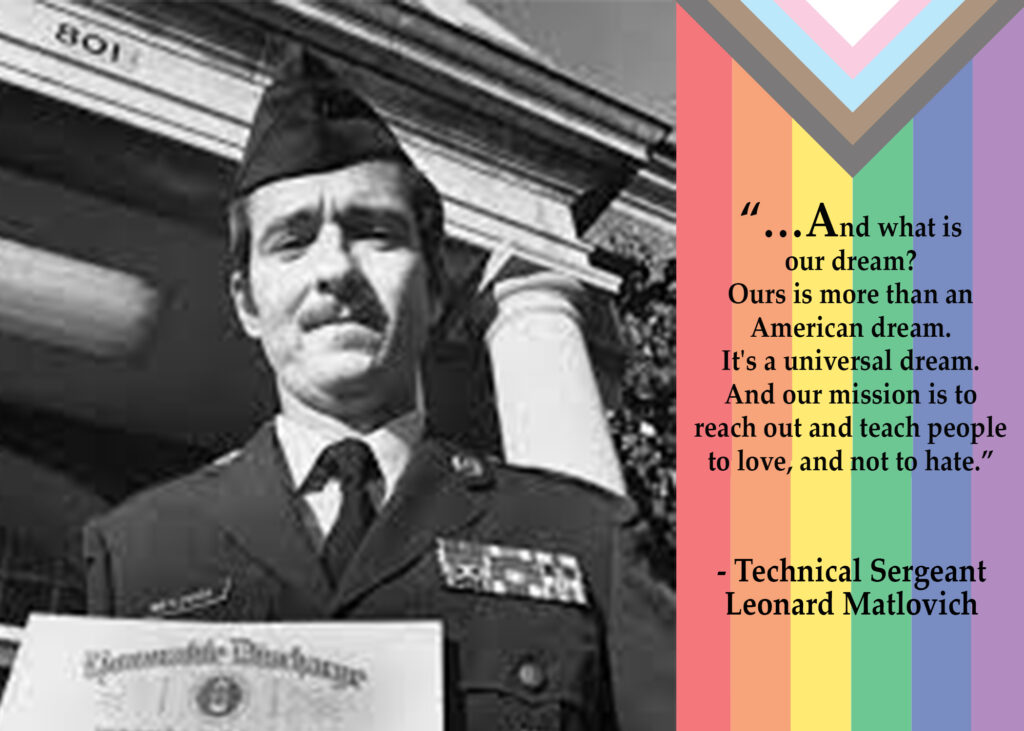
Leonard P. Matlovich (he, him, his), a Vietnam war veteran, earned both a Purple Heart and Bronze Star for his service. He was also the first gay service member to purposely (and purposefully) out himself to challenge the ban against gays in the military. His fight to remain in the Air Force after coming out was something both LGBTQ military personnel and the LGBTQ community at large rallied behind. TV interviews, newspaper articles, and a television movie followed, as did the cover of Time Magazine (Yes, THAT Time Magazine – a precedent for the time) in 1975. Matlovich strongly challenged the Military’s policy against LGBTQ people. Technical Sergeant Leonard P. Matlovich passed away in 1988.
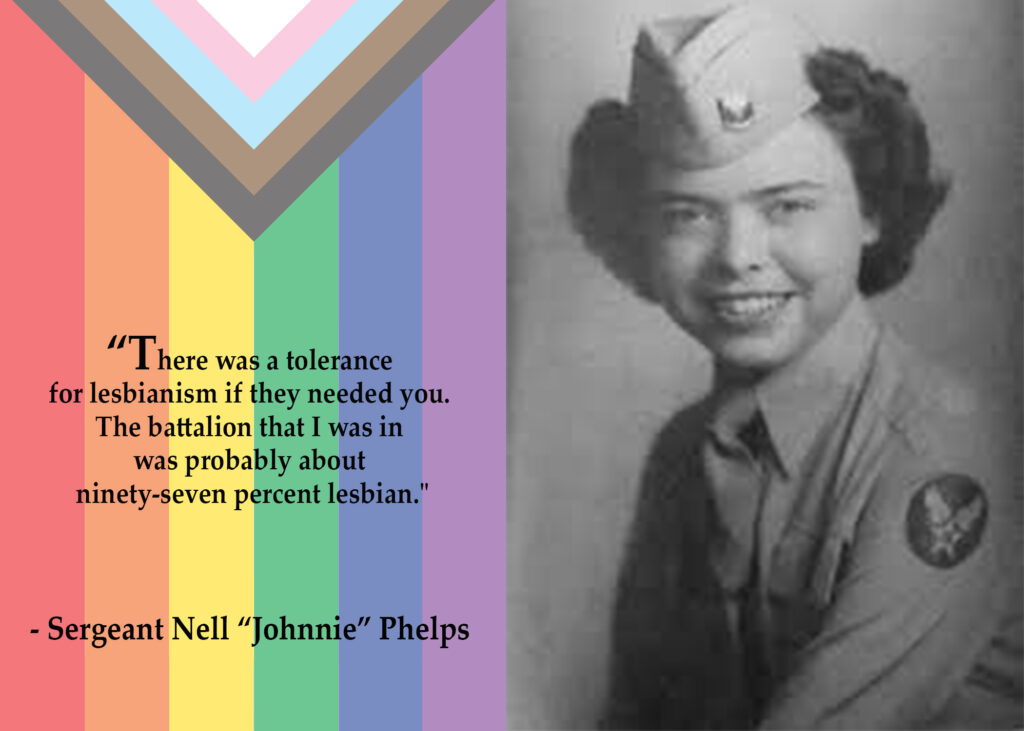
Nell “Johnnie” Phelps (she/her/hers) became somewhat of a legend for a conversation she had with General Dwight D. Eisenhower during her service as a member of his staff. Phelps saw Eisenhower as a leader who truly cared about the well-being of those under his command. During the post-World War II occupation of Germany, the general learned of a large number of lesbians in the Women’s Army Corps (WAC) and called WAC Sergeant Phelps into his office and asked her to create a list. After the general indicated the need “to get rid of them,” the sergeant said she would make the list, but noted that WAC was among the military’s most highly decorated battalions, she herself having been awarded a Purple Heart. (Here comes the part I love about the story.)
Sergeant Phelps told General Eisenhower she would compile the list, but stated that he should know that her name would be at the top. To which Eisenhower’s secretary, who would type up the list, added that Sergeant Phelps would have to be second on the list as her name would be first. With that, the general shook his head at the two women and told them to forget the order. Sergeant Nell “Johnnie” Phelps passed away in 1997.
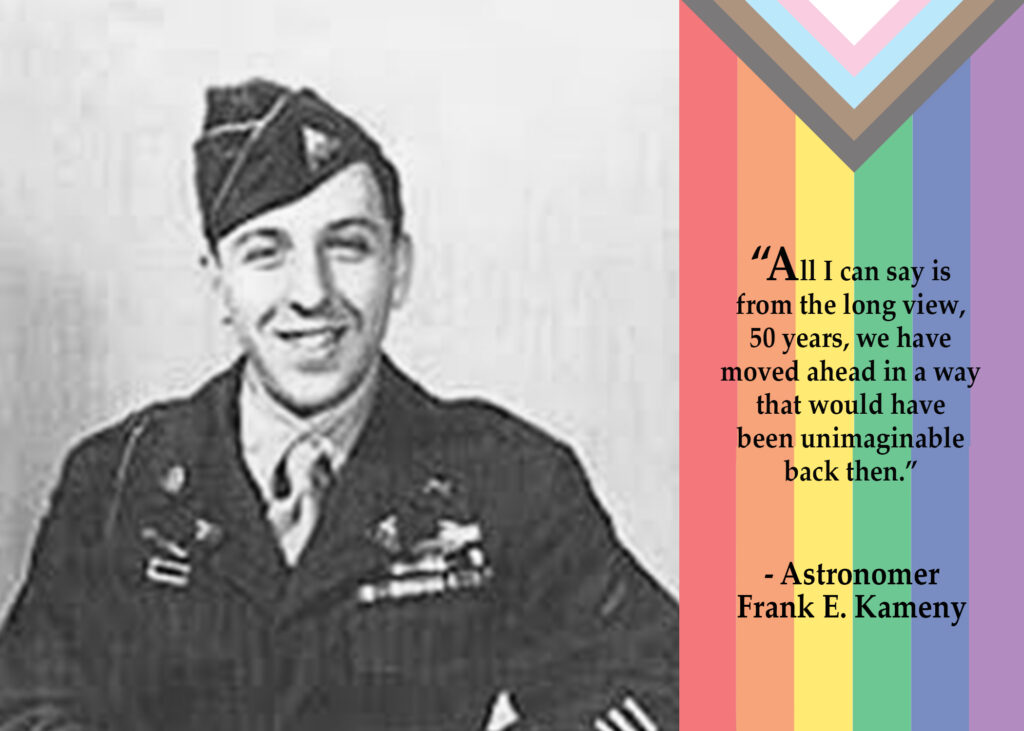
Dr. Frank E. Kameny (he, him, his), who served in World War II and later as a civil service astronomer with the US Army’s Map Service, was fired and banned from federal employment in 1957 because he was gay. He was not alone, as over 10,000 LGBTQ+ workers were forced from their jobs during the 1950s and 60s, a period known as the “Lavender Scare.” Kameny opted to sue, but lost. He tried to appeal, but lost again. He continued, bringing the first civil rights action suit regarding sexual orientation to the US Supreme Court. Kameny argued that the government’s actions toward the LGBTQ+ community were, in his words, “an affront to human dignity.” Still, the court denied his petition. He continued to fight for civil rights for 18 more years, until finally the US Civil Service Commission reversed its policies excluding homosexuals from government employment. In 2007, fifty years after he was removed from his job, Kameny received a formal apology for being fired based solely on his sexual orientation. He has been often called “one of the most significant figures” in the American gay rights movement. Astronomer Frank E. Kameny passed away in 2011.
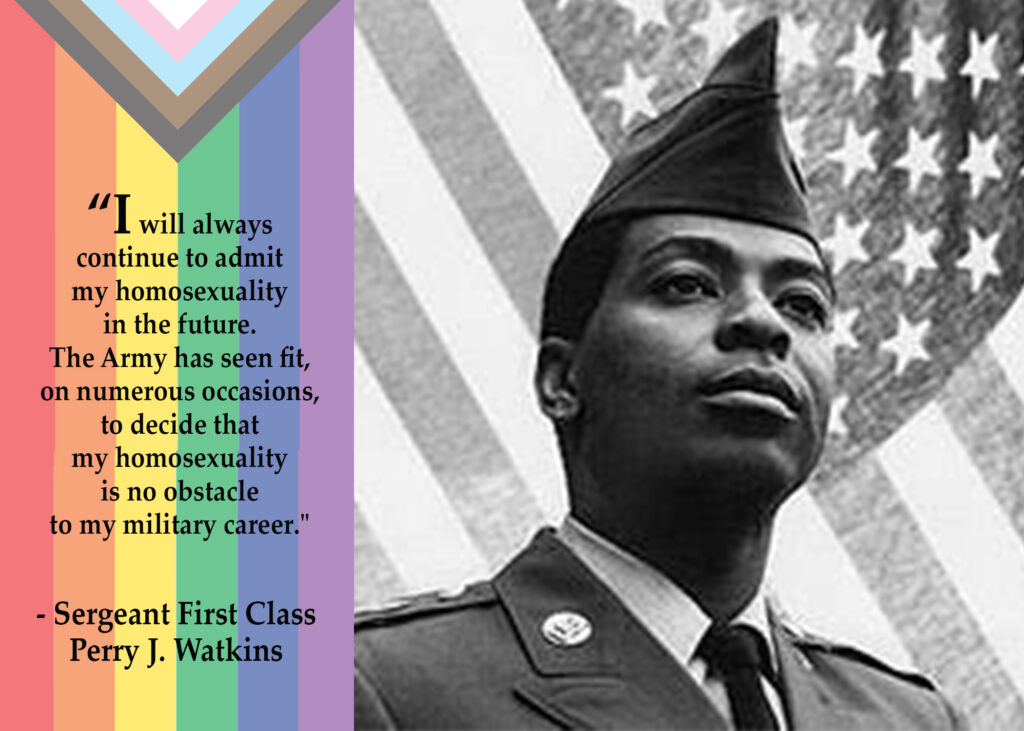
Perry J. Watkins (he, him, his), a young African-American living in Germany where he studied dance, was drafted in 1968. Watkins was living openly as a gay man and even reported this at his induction. The Army took him anyway, despite the policy at the time that would not allow LGBTQ+ people to serve in the US military. Within his first 6 months he was sexually assaulted and requested to be discharged 3 times. The Army refused his requests on the grounds that an admission of homosexuality was not sufficient to warrant a discharge. He reenlisted again, stating again that he was gay. (Like me, you may be wondering why he would continue to serve in the army under these conditions.) Watkins used his military benefits to their fullest degree, not only obtaining a college degree in business administration, but also traveling the world. The Army’s investigation continued and each time it was recommended that Watkins’ sexual orientation was “not detrimental to his job performance” and there was no reason to discharge him.
In 1980, after he had reenlisted a total of 3 times, the US Army revoked his security clearance. The ACLU, on Watkins’ behalf, sued the Army to reinstate his clearance. The Army’s response was discharge proceedings, claiming that now under the new regulations, an “admission of homosexuality” was sufficient for a discharge. A few years later in 1983, he was allowed to reenlist a 4th time, but was discharged shortly after in 1984. His court case continued. Finally in June 1988, the US Ninth Circuit Court of Appeals found that the Army’s “regulations violate the constitutional guarantee of equal protection of the laws.” Watkins was awarded a retroactive promotion to sergeant first class, retroactive pay, full retirement benefits, and an honorable discharge. It was the first time a US appeals court ruled against the military’s ban on service by gays and lesbians and bisexuals. Sergeant First Class Perry J. Watkins passed away in 1996.
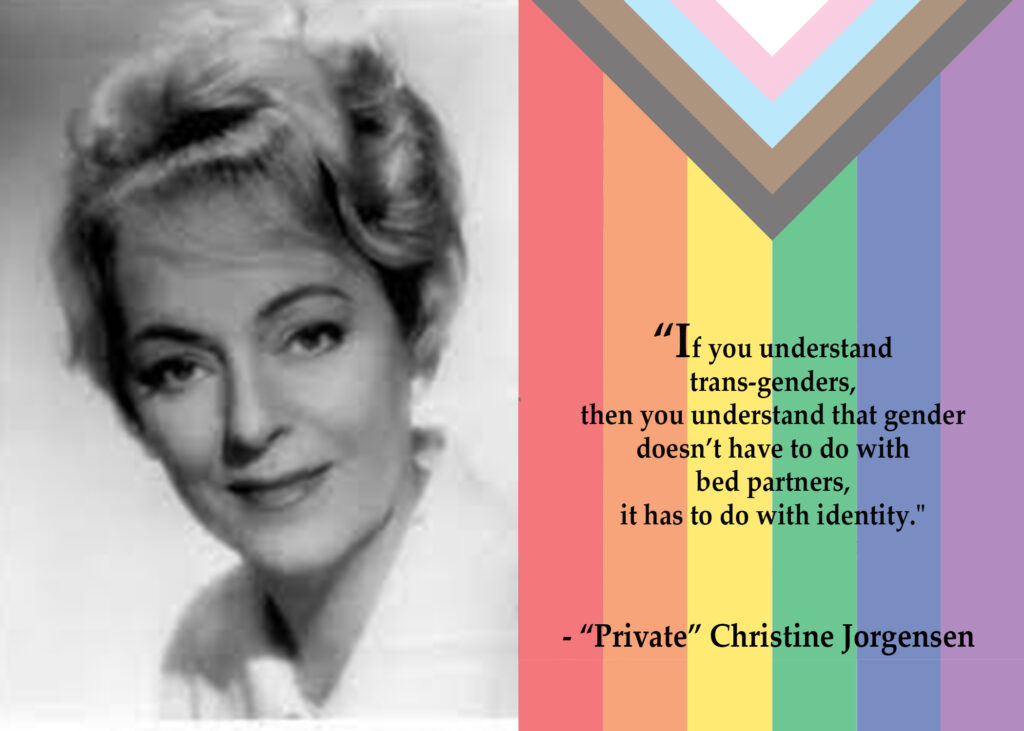
Christine Jorgensen (she, her, hers) may be a name you have heard. She was the first person to become widely recognized in the United States for having sex reassignment surgery and with that Jorgensen became an almost instantaneous celebrity. With her great poise and confidence, she continued her rise to fame as an actress, singer and nightclub entertainer. However, many people don’t know that Jorgensen also served in the US Army during and after World War II. In fact, when she returned to the US from Denmark, the headlines of the time read “Ex-GI Becomes Blonde Beauty.” One of Jorgensen’s greatest accomplishments for the LGBTQ+ community was her use of her celebrity to advocate for transgender people. Private Christine Jorgensen passed away in 1989.
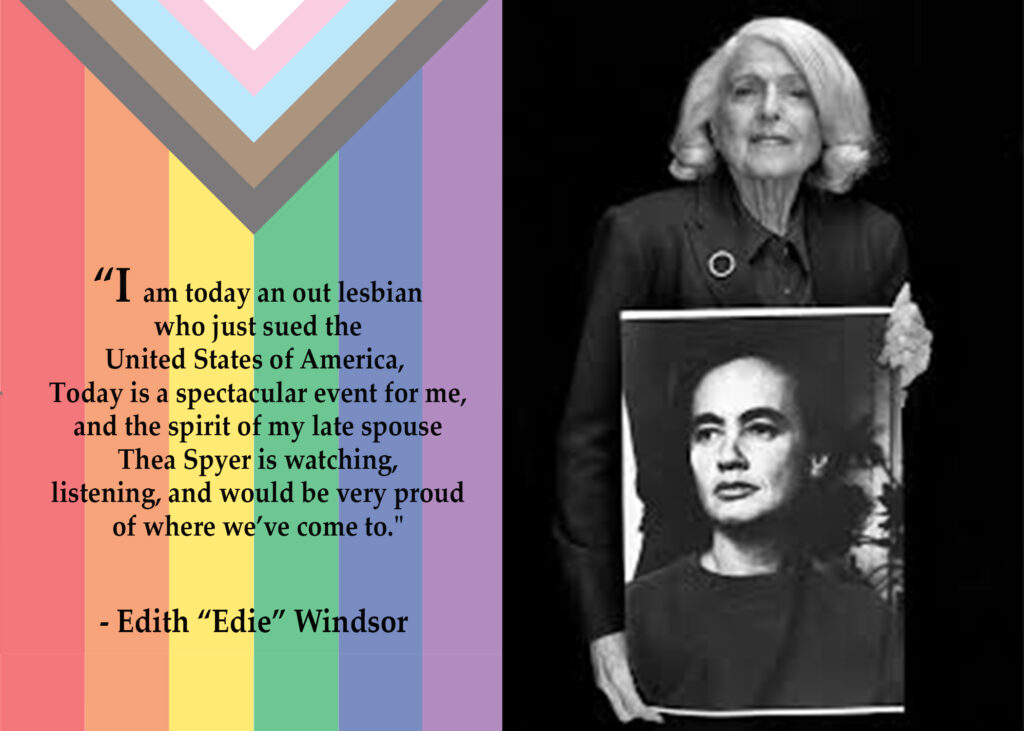
I’d like to give honorable mention to Edith “Edie” Windsor (she, her, hers) who was an American LGBTQ+ rights activist, but was not in the military. However, she was a military wife to her spouse, Thea Spyer, who was. After her partner’s passing, Windsor was the lead plaintiff in the 2013 Supreme Court case which overturned Section 3 of the Defense of Marriage Act. Section 3 denied spousal protections such as Social Security, health insurance, retirement savings, as well as veterans’ benefits. This was considered a landmark victory for the same-sex marriage movement in the United States. This decision helped push the Obama Administration and federal agencies to extend rights, privileges and benefits to married same-sex couples. Edith “Edie” Windsor passed away in 2017.
If there’s someone you want to honor or recognize this Memorial Day or during Pride Month, check out the latest card from the folx at Queery. With a progress rainbow dog tag and pride message, you’ll find this the perfect note card to honor LGBTQ+ military personnel. It is also a great little card to give to someone who’s struggled with being LGBTQ+ (and who of us hasn’t at one time or another).
Proceeds from every card will be shared with SPART*A, the nation’s leading transgender military service organization, and Minority Veterans of America (MVA), an organization designed to create belonging and advance equity for underrepresented minority veterans. Simply go to Queery’s GoFundMe site for details on how you can get yours for the upcoming holidays.
Enjoy your Memorial Day weekend and Pride Month and take a few moments to remember those who fought for our freedom and our civil rights.

